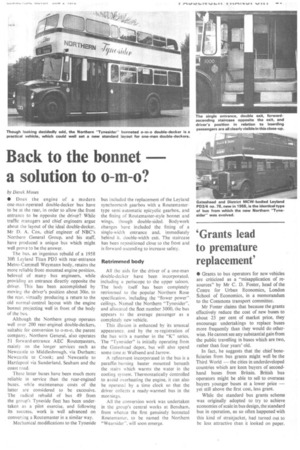'Grants lead to premature replacement'
Page 39

If you've noticed an error in this article please click here to report it so we can fix it.
• Grants to bus operators for new vehicles are criticized as a "misapplication of resources" by Mr C. D. Foster, head of the Centre for Urban Economics, London School of Economics, in a memorandum to the Commons transport committee.
Mr Foster claims that because the grants effectively reduce the cost of new buses to about 25 per cent of market price, they encourage undertakings to replace buses more frequently than they would do otherwise. He cannot see any substantial gain from the public travelling in buses which are two, rather than four years' old.
In fact, he suggests that the chief beneficiaries from bus grants might well be the Third World — the cities in underdeveloped countries which are keen buyers of secondhand buses from Britain. British bus• operators might be able to sell to overseas buyers younger buses at a lower price — yet still above the first cost, less grant.
While the standard bus grants scheme was originally adopted to try to achieve economies of scale in bus design, the standard bus in operation, as so often happened with this kind of straitjacket, had turned out to be less attractive than it looked on paper.
















































































































































